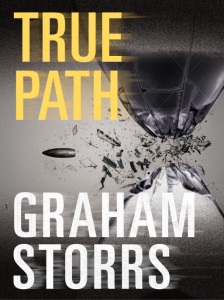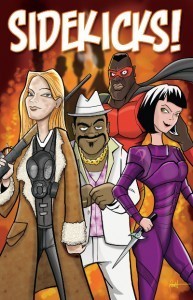Graham Storrs's Blog, page 10
May 24, 2013
One Week to the Timesplash Release
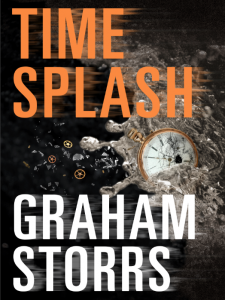 My novel, Timesplash is due for release on 1st June. That’s exactly one week from today. It’s got me wondering about the concept of a ‘release date’. You see, the book has been ready for a while and people could have been buying it for a couple of weeks now. In fact, you can buy it, right this minute, if you want to. You just won’t get your copy until 1st June. I’ve been trying to decide whether holding it back serves any purpose and I can only think there must be a marketing reason for it.
My novel, Timesplash is due for release on 1st June. That’s exactly one week from today. It’s got me wondering about the concept of a ‘release date’. You see, the book has been ready for a while and people could have been buying it for a couple of weeks now. In fact, you can buy it, right this minute, if you want to. You just won’t get your copy until 1st June. I’ve been trying to decide whether holding it back serves any purpose and I can only think there must be a marketing reason for it.
Having a release date for something that could be bought right now, suggests a build-up of excitement as the day approaches, desperate fans in a frenzy of anticipation, queueing around the cyberblock to be the first to get their hands on a copy – like they do for Dan Brown and J.K. Rowling novels. But I’m not Dan Brown or J.K. Rowling and there is a distinct lack of frenzy going on. All across the world as the Big Day approaches, people are, if anything, becoming less frenzied, positively relaxed as far as I can see.
Of course, there is one real marketing benefit that a release date brings and that is to do with the way that book retail sites like Amazon calculate their book popularity rankings. If a lot of people by a book on a particular day, the ranking algorithm says to itself, “Ey up, it looks like this book is popular, eh but.” (You do know that algorithms talk to themselves in broad Yorkshire accents, don’t you?) So publishers (and self-published authors) try to mount a “Day 1 Purchase Campaign”. That is, they try to encourage as many people as possible who want the book, to buy it on the release date. That then pushes the book up the rankings, however briefly, in the hopes that it will hit the number one spot in its niche category (“technothrillers” and “science fiction” in Timesplash’s case). And the reason they want this is because, when you type a category into Amazon (say) to see what’s new in your favourite genre, the most popular books at that moment are the ones that appear at the top of the list. That means people will actually see your book – a prerequisite for them knowing that it even exists. So, extremely important, really. (Which means, if you are planning to buy Timesplash, the very best time to do it would be on 1st June. But, don’t worry if you’re being held by the police for minor public decency infringements that day, I’ll be just as happy if you buy it some other day.)
Of course, it could be that the release date is purely for the publisher’s benefit – an end point for the set of activities that lead to the creation of the book in a form that customers and buy and read, something to encourage author, editor, proofreader, layout, artwork, marketing, accounts, and everyone else to get their fingers out and achieve something rather than goofing off. As a one-time project manager, I know how important these milestones are in the life of a product.
Apart from that, the only other benefit a release date seems to confer is that it provides a ‘timing point’ for the co-ordination of all the marketing activities that go on before and after the release of a new book. And I suppose that’s not exactly non-trivial either, considering how many people are involved and all the stuff they’re doing.
May 19, 2013
Timesplash and True Path Cover Art
I know I was a teensy bit snarky about how long it took to get here, but I hope you’ll agree the wait was worth it.
[drum roll] Ladies and Gentlemen (and anyone else who’s reading this), I give you the cover art for Timesplash and True Path.
My thanks to the team at Momentum for putting together two great covers.
So, what do you think? I love the little cogs. And that bullet! I’m all goosey! Now, tell me you don’t want to see that on your Kindle Fire (or iThing, or Kobo…)
Countering Anti-Vaccination Stupidity
I saw this on Reddit today and it struck me as a great idea. So I thought I’d share it. Health care professionals in Australia are talking about a coming epidemic of preventable diseases – like polio and measles – which kill and maim children (and unvaccinated adults). It’s all because a bunch of half-wits think that vaccinations are dangerous. Well, they are, in a vanishingly tiny proportion of cases, but the diseases they prevent are deadly and destroy the lives of a huge proportion of the people who contract them. You would have to be a complete idiot to risk the lives of your children and everyone else’s children by not vaccinating on the basis of an infinitesimal risk compared to the massive risk that diseases like polio pose.
Incredibly, there are maniacs at loose out there who are actively promoting their discredited and, as far as anyone rational can see, purely superstitious belief that vaccination is dangerous. They have persuaded so many feeble-minded people to their irrational beliefs, that the incidence of preventable disease is rapidly rising and children are now being killed and maimed unnecessarily. These irresponsible, dangerous people and their organisations have become so popular that search engines rank their anti-vaccine, anti-science websites up there with proper scientific and medical advice about vaccination. That’s where this post on Reddit comes in.
Finally, the Government is getting serious about squashing the misleadingly named Australian Vaccination Network. The problem is, their nutty claims should never have been tolerated by the media in the first place.
Sadly, when you type in “Australia vaccination” into Google, the Anti-Vaxers some up as result number two, meaning that people get exposed to their harmful anti-science, and might end up putting their kids (and your kids) in danger.
Want to help stop these idiots from being so prominent in searches? Do you own any websites? If so, here’s what you can do:
/1/ Write a short article about vaccination on your website.
/2/ Create 1 – 2 links using the words “vaccinate“, “vaccination” or “Australian vaccination” as the link words, and link them to these reputable vaccination sites:
http://www.vaccination.org.au/
http://www.immunise.health.gov.au/
http://www.betterhealth.vic.gov.au/bh...
This will help put these websites above the AVN website in google search results.
/3/ Use the keywords ‘Australian Vaccination Network‘ to hyperlink to the following website: http://stopavn.com/ [like I just did here]. This will help make sure that people who search for the AVN see as the first search results a site that discredits them.
If you do this, you can have a direct impact on vaccination in Australia. So, help out – and please, share this message! Note – I am not associated with any anti-vaccination group – just an Australian wanting to do my part.
May 9, 2013
True Path (Timesplash #2) is Ready for Pre-Order
Yes, this is it. The Timesplash sequel, True Path, is finally available for pre-order (from Amazon and iTunes). And this is what it looks like:
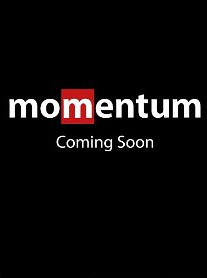
True Path: radical cover design
The cover design struck me as pretty “out there” when I first saw it but it’s growing on me. What’s more, the designer has definitely kept the “family likeness” to the Timesplash cover (see for yourself). I like the boldness of the black and that little splash of red that says, “Mmmmm?” It’s a cover that yells out, “Judge this book by me if you dare!”
I am painfully aware that there are people out there who bought Timesplash when it was first released way back in 2010 and have completely forgotten who I am and what all the fuss is about. Now is the moment to say I’m sorry the sequel took so long brewing and you might want to scan that old copy just to remind yourself who the main characters were. Let’s face it, we’re all a lot older now and your memory isn’t what it used to be.
And to all those lucky people who are coming to the Timesplash series for the first time, you might want to grab a copy of the first book too. I’m fairly sure that True Path could be read on its own, or that you could even read True Path first and Timesplash second, but I feel a richer, deeper experience awaits anyone smart enough to read both books in the right order.
As ever, I’ll keep you posted on developments as the release date approaches.
May 2, 2013
Dammit! Cons Really Work.
I just spent a huge amount of time, stress, and money attending a spec. fic. writing convention, Conflux 9. It was a bugger to get to (ten hours travelling each way), hugely expensive (about $2,000 all found) and most of the panels I attended were either boring or frustrating (I need a placard that I can raise whenever a publishing professional speaks that says, “Do you have anything other than anecdotal evidence for that assertion?”) What’s worse, I’m a chronic introvert for whom being in a crowd feels like poison darts are being showered on me from all directions. It was hell.
Yet, I have to admit, if you want to be a professional writer, there is little else that can be as beneficial to your career as mixing it with your peers at events like this.
I met a lot of writers I had only previously met on social media. In every single case, it was great to meet them. They’re even better in real life. I met a lot of writers I didn’t know at all (even one world-famous guest of honour, whom I’d never even heard of, which was momentarily embarrassing) and they were all great too. I also renewed my acquaintance with people I’d met at earlier conventions – some of whom I still regularly tweet with. This was all good but, in itself, probably not worth the various costs and torments of being in Canberra that week.
What did make the whole thing worthwhile were:
1. Two very important publishers – one of them from a Big 6 publishing house – asked me to send them manuscripts.
2. Several people came up to me after I did a brief reading from Timesplash and said how much they’d enjoyed it, and several more got in touch via Twitter in the following days, to say the same thing.
Number 1 won’t seem much of a big deal to you unless you have already spent decades, as I have, longing for this kind of attention from big-name publishers. In terms of career development for a writer, it just doesn’t get better than this.
Number 2 may not seem like a big deal either, except, it is! Writing fiction is one of the very few fields of entertainment in which it is quite possible that a practitioner might never meet their audience. To have it happen and to see such a positive reaction, was just pure magic.
So, would I do it again? Well, I’ve no doubt I should…
April 21, 2013
Author Interview With Amanda Bridgeman
 When I was considering signing with Momentum, I had a poke around to see what else they’d published. I immediately found several books I wanted to read (a very good sign) and one of those was Aurora:Darwin by Amanda Bridgeman. A distress signal from the edge of inhabited space? Two people in a struggle for survival? What’s not to like? Sadly, the book isn’t due for release until 1st May (but you can pre-order it at Amazon and other online stores). I’m looking forward to it.
When I was considering signing with Momentum, I had a poke around to see what else they’d published. I immediately found several books I wanted to read (a very good sign) and one of those was Aurora:Darwin by Amanda Bridgeman. A distress signal from the edge of inhabited space? Two people in a struggle for survival? What’s not to like? Sadly, the book isn’t due for release until 1st May (but you can pre-order it at Amazon and other online stores). I’m looking forward to it.
Then someone at Momentum realised Amanda and I were on the same “Newly Published Writers Showcase” panel at Conflux 9 in Canberra on 28th April (everyone has to come!) and put us in touch. So now I’d like to introduce you all to Amanda. She kindly agreed to answer a few questions about herself and her work.
Aurora:Darwin is your first published novel and it’s speculative fiction. Had you been writing long before publishing success came your way, and is all your work spec fic?
I used to write a lot when I was in my early teens, but then seemed to stop for several years as I immersed myself in film. I re-started writing again about 5 years ago, and that is when AURORA:DARWIN was born. I had initially sat down to write it as a script, but found it much easier to write the story out as a novel, where I could explain and express all that I wanted to. Before I knew it the book was finished, but the story was not, so the Aurora Series came into being. I only started seeking a publisher at the start of 2012, and by August of that year I’d had two offers, so I was pretty lucky in that sense. So far all my work is spec fic, and for the immediate future that will be my focus as I develop the Aurora Series and work on a couple of other stand alone spec fic novels. I do have a few stories in my mind that are in different genres, though. So you never know!
How have your family and friends reacted to you becoming a published author?
They’ve been fantastic, so supportive! They’re ones getting all excited and I’m the one trying to keep my feet on the ground and not get my hopes up!
As an Australian writer, do you feel you bring a different perspective or flavour to your work, and would that make your fiction more or less appealing to a global audience?
The good thing about AURORA:DARWIN is that is has a global focus. I specifically wrote a story that would hopefully appeal to an international audience, as well as appeal to both sexes! I think here in Australia we are exposed to so many different cultures, particularly the US and UK cultures, that it’s part of our make-up to be pretty accepting, understanding and flexible. The hero of AURORA:DARWIN is an African American, and there are several other American characters, as well as a couple of British, European and Antipodean characters. So, I guess as an Australian writer, I’ve brought an international flavour to my work, based on the upbringing I’ve had. That said, being Australian, I think we’re very proud of who we are and where we’ve come from, and so naturally one of main characters is an Aussie, who is also proud of where she came from.
Science fiction fans are notoriously difficult to please. Do you do a lot of research when you write a book? Or is that not the kind of reader you’re writing for?
I think another good thing about the sci-fi that I write is that it’s simple. It’s simple to read, with interesting, twisting plots throughout the series, but without ever over-complicating things. I personally like books that are easy to read. If I have to go back and re-read a paragraph because I don’t understand what the writer meant, then that to me is too much work. Reading should be fun and easy. My eyes should glide over the words. If I’m having to stop every few paragraphs, then that ruins the experience. They say the golden rule of writing is to write what you want to read, well that is exactly what I’ve done. AURORA:DARWIN is set only 60 odd years in the future, so I have done basic research to formulate the military space world of my book so that it holds a sense of reality, but the beauty of fiction is simply that – it’s fiction. I’m not writing a science paper, I’m writing an adventure with which you can switch off from reality for a while.
What are you reading at the moment and what genres engross you the most?
I’m currently reading fellow Momentum author Nina D’Aleo’s The Last City. So far it’s fantastic! I’m learning a thing or two about worldbuilding from her! I like anything with a little drama, action and yes, the fantastical.
Your publisher is Momentum, a digital imprint of Pan Macmillan. Did you consider self-publishing, or did you go straight to the Big Six publishers?
I had considered self-publishing, but only if I couldn’t get a traditional publisher. My first choice was always to go with one of the Big Six (or is that Big Five now?), as personally I don’t think you can beat their knowledge, contacts, expertise, etc, etc. I’m still very new to this writing ‘gig’, so I’m still learning as I go, but I have to say that my first experience so far has been great. I wouldn’t do anything differently. That said, if I haven’t received any offers, I would’ve gone down the self-pub route, but I would’ve done it the expensive way and paid good money for the right editors and graphic designers. I’m a bit of an ‘all or nothing’ girl. If I’m going to do something, then I try to do it right.
Tell us something about the ideas behind Aurora:Darwin, where they came from and why you chose those things to write about out of everything else in the universe.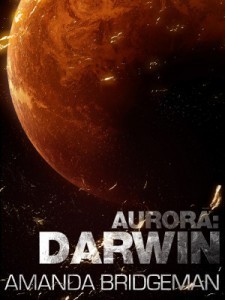
Well, I’m a huge sci-fi / action / horror fan, particularly in regards to the genre films I watched growing up (the Alien series, Star Wars, X-Men series, Leviathan, Deep Star Six, Starship Troopers, etc). I basically love films where you have a group of characters banding together to survive something, and I also love films where you have the lone hero trying to survive something (Jaws, Die Hard, etc), so I’ve drawn from both these themes when writing the Aurora Series. I’m also a bit of a sucker for soldiers and cops (the result of my attraction to the ‘masculine hero’ and action films), so naturally soldiers became my chosen group to terrorise. I had the basic story of A:D in my head, but after I saw ‘I Am Legend’, Will Smith became the character of Saul Harris for me, and I just began to fill in the blanks from there. Basically, in a nutshell, I’ve drawn inspiration from many sources, thrown it all into a bowl, mixed it about, added my own flavour, and out came AURORA:DARWIN.
In the book, women have not previously been allowed in the outer zones. Does this imply that you expect the subjugation of women to continue well into the future? Does Aurora:Darwin have a feminist subtext?
Oooh tricky question. Look I think women will still have to fight for a little while longer, but it’s getting better day by day. They’ve only just allowed women on the frontline, and we’re still not hitting the same pay-packets that men in the corporate world do. So we’re certainly not there yet, and it’s been many years of trying, but we’re headed in the right direction. I guess in some respects A:D may have a feminist subtext, although I didn’t intentionally write that in, it just happened. I think the argument of women on the frontline will continue for a little while yet. Although hopefully not another 60 years like in A:D! Heh heh.
That colon in the middle of the title suggests you have more Aurora novels in the pipeline. Have you plotted out a whole series? What opportunities does such a grand design bring?
Before I approached a publisher I had several books written! As I mentioned earlier, AURORA:DARWIN was only supposed to be one book, but the story grew and took on a life of its own. I actually think it’s been beneficial as I know, quite solidly, just what is going to happen in the future and how the characters are going to get there. So it helps make the editing easier, as I know just when to start laying the breadcrumbs…….
Where will your imagination take you after the Aurora series? Do you have any projects planned?
Yes! I’ve still got a couple of books in the Aurora series to write, but I’ve got another spec-fic one that I’m dying to write. It’s completely different from the series, no soldiers or cops, just ordinary people thrown into extraordinary circumstances. I’m quite excited about that one! I’ve also got a medieval one, an action-adventure one, a romance, a couple of YA/NA ones, and a rock ’n’ roll road-trip one I’m keen to write! I just need to find the time!!
Thanks for having me on your site!
You’re welcome!
BIO:
Born and raised in the seaside/country town of Geraldton, Western Australia, Amanda hails from fishing and farming stock. The youngest of four children, her three brothers raised her on a diet of Rocky, Rambo, Muhammad Ali and AC/DC. Naturally, she grew up somewhat of a tomboy, preferring to watch action/sci-fi films over the standard rom-com, and liking her music rock hard. But that said, she can swoon with the best of them and is terrified of bugs.
She moved to Perth (WA) to pursue her dreams and study film & television/creative writing at Murdoch University (BA Communication Studies). She is an office manager by day, and by night a writer. She loves most genres, but is particularly fond of the Spec-Fic realm. She likes action, epic adventures and strong characters that draw you in, making you want to follow them on their wild, rollercoaster rides.
Amanda’s website is at http://amandabridgeman.com.au/
April 20, 2013
Thinking About Population
 On 31st October 2011, according to the UN, the world’s population reached 7 billion. They may be wrong. These things are hard to estimate. But, if they are, it is only by a year or two. Most of those people have arrived since I was born. The BBC has a cute calculator that shows the population (approximately) on your birth date. For me, it was less than 3 billion. There are many scary statistics about population. For example, it should only be about 14 years before we reach 8 billion. The population of Australia – which I came to 16 years ago – has increased by 15% since I got here. And so on.
On 31st October 2011, according to the UN, the world’s population reached 7 billion. They may be wrong. These things are hard to estimate. But, if they are, it is only by a year or two. Most of those people have arrived since I was born. The BBC has a cute calculator that shows the population (approximately) on your birth date. For me, it was less than 3 billion. There are many scary statistics about population. For example, it should only be about 14 years before we reach 8 billion. The population of Australia – which I came to 16 years ago – has increased by 15% since I got here. And so on.
Population is a terrific bogeyman in sci-fi. Asimov did it best – remember Terminus? the Caves of Steel? Like Thomas Malthus, sci-fi writers have long made us shudder at the prospect of unchecked population growth. The Sixties and Seventies saw a big revival of these ideas (which were 150 years old at the time!) and the Club of Rome’s The Limits to Growth (1972) pretty much set the agenda for every doomsayer of the past 40 years. Basically, we’ve known forever that capitalism is unsustainable. And yet, the miracle of prosperity and (some say) education appears to be saving us from our own laissez faire philosophy. Even despite increasing longevity, countries that do well have birth rates significantly below “replacement level” – that is, more people die than are being born. The population in these First World countries is falling, and, naturally, ageing, on average. As a baby boomer myself (O blessed generation) I can’t help but feel privileged to be in the last great demographic bulge before the Apocalypse comes.
In my own near-future sci-fi, my protagonists live in a world of flooded coastal cities, and Siberia is the bread basket of Europe. Climate change is such a depressing bogeyman. Resource wars, famine, plagues, refugees, and wild, wild weather are real downers, while overpopulation was at least packed with conflict and characters and waycool tech for continent-spanning arcologies. (Yes, I know the Great God Hamilton has domed cities and all, but most futurists are far less intelligent about it.) In my worlds Bahrain is a blasted desert and the oil is long gone, but the capital Manama is the thriving home of the Two Seas Spacebridge. There can be sparkling technological beauty in any future we throw at ourselves.
The world’s population may well carry on its exponential growth – in which case, the only hope for our survival as a species is to move into space and take our growth elsewhere. If it keeps growing at the present rate, Earth’s population will be 16 billion by 2100. Of course, most people hope this won’t happen. they hope that countries like China will become prosperous (and, possibly, educated) and its 1.5 billion people will stop having kids. If this kind of thing happens, Earth’s population might level off at about 10 billion. That’s a 40% increase, of course. Just imagine the traffic jams! (Let alone the resource wars, famines, plagues, refugees, and coast-to-coast arcologies.)
Of course, by 2100 there will be no oil left and, probably, no coal. The global temperature will be at the very least 4 degrees higher (maybe 6), sea levels will be up by at least a metre (maybe 4 metres), and the world’s deserts will have spread by 50%. (The world’s rain forests will all have been cut down by then, there will be no other primates but ourselves, and geopolitics as we now know it will be a distant memory.) It’s no wonder, really, that sci-fi is so gloomy these days. Anybody who thinks seriously about the future is doomed to a life of misery and depression.
The one tiny thread of hope is that we get off this goddamned rock and learn how to thrive in space. Gerard O’Neill had it right. It is the only hope for us. And it’s not so hard to imagine. We could do it. But we need to do it soon, before the shit we’re stirring up down here completely overwhelms us.
April 8, 2013
Ding Dong
I’m not having a good day. Margaret Thatcher has just died and all the right-wing, people-hating mainstream media, as well as a lot of very ignorant people who know nothing about it, are eulogising her.
I lived in the UK through the Thatcher years. I come from a poor town in the North of England. Thatcher was a scourge to working people. She was a monster. A blight. She imposed her right-wing, monetarist, free-market, corporation-loving, exploitative, soul-crushing, stupid, destructive ideology on my people, my family, and my friends. In the last great battle of the class war, she destroyed the trade union movement in Britain and left us all at the mercy of the corporations and their greedy, uncaring owners.
By the time Thatcher left office, my home town had 20% unemployment and the idea of “disenfranchised youth” was firmly entrenched in our vocabulary.
I can’t blame anyone for throwing impromptu parties in the streets of Britain today. And anyone who is surprised that it’s happening wasn’t on the receiving end of her “reforms”. She was a poisonous woman with poisonous ideologies. The whole world became infected with her cruel and vicious ideas and the Global Financial Crisis and the millions it has harmed is just the most recent manifestation of the sickness she bequeathed us.
I wish everyone would shut up about what a “strong” leader she was (Stalin was a strong leader, so was Idi Amin, it’s not a recommendation) and what a role model she was for women (it’s like saying George W. Bush was a role model for men!) The more I hear the mindless praise of this awful person, the more I remember the bitter hopelessness of those years, the more I think about how much her existence has damaged the world, and the angrier I get.
March 26, 2013
The Mind is Not a Soul: Why Uploading to a Computer Won’t Bring Immortality
I just read about a Russian “tycoon” called Dimitry Itskov who is putting money into a venture called Initiative 2045, “a non-profit organization focused on creating an international research center where scientists will research and develop the technologies to make eternal life possible,” according to nextbigfuture.com. Apart from the tragic news that people still say “tycoon”, the real tragedy of this tale is that it’s a complete waste of time and effort.
The whole notion that a human consciousness can be “transferred” from one computational platform to another is based on the misconception that the human mind is really a “soul”, some essential you-ness that can be poured from one vessel into another like a liquid. The reality is that a mind is more like a piece of software running on the brain’s hardware. The only you-ness involved is the feeling this program has of being you. It can’t be taken from one place and put in another any more than this instance of LibreOffice I’m using can be taken out of my computer and put into another one. Yes, your mind can be copied (eventually, in theory) and the copy run in a brain simulator, and that copy, if identical, will be convinced that it is you – but it won’t be you in one very, very important way. The you that the copy was taken from will still die.
The illusion is enhanced by the usual scenario in which mind uploading is spoken about. You’re on your deathbed having lived a long and carefree life. The neuromancers come and your brain is scanned – often destroying it in the process for some reason. Your body expires. But, lo! You find yourself alive and staring out at the world through a pair of video cameras, your thoughts zipping along at 200 petaflops as you plan your first ten million years of digital immortality.
But consider a different scenario. You’re 32 years old when your brain is non-destructively scanned (the same age as our Russian tycoon is right now). You climb out of the scanner to find yourself being watched by a pair of video cameras and you introduce yourself to your digital copy. Of course, your copy now believes it is you and nothing you can say can dissuade it. It feels like you, it has all your memories, it is secretly in love with the scanner operator, just like you are. But, to you, it might as well be a complete stranger. You don’t feel what it feels, you don’t see what it sees, and, as the days go by, increasingly, you don’t know what it knows.
And, when the Christian fundamentalist who hates the idea of you and your kind “playing God” bursts in with his Sig Sauer and pumps you full of lead, as you lay on the scanning room floor, bleeding out, trying to tell the scanner operator with your last breath about the love you’ve hidden for so long, you realise that you are actually dying. Creating a copy of you didn’t make you immortal at all. Bummer!
Of course, there are shades of grey in all this. (No, no, forget BDSM for a moment and concentrate.) You can argue that your “self” is recreated each morning when you wake from sleep. You can postulate a slow, sliding process of gradually replacing your mind with a functional copy that resides in your head like the “jewel” in Greg Egan’s Axiomatic collection, and eventually takes over running your body. But the fact remains that self-awareness is a trap that ensnares us in our own mortality. Even if your consciousness were being rebooted every day (which it isn’t) there is no way at all of making it move from one place to another. It isn’t a substance. It cannot be relocated. If you stop it running, you’re dead – whatever else might still be alive that thinks it’s you.
March 16, 2013
Sidekicks! Why Should the Heroes Get All The Attention?
Y’all may remember, some time last year, I had an essay about world-building published by Alliteration Ink in a collection of essays about world-building called “Eighth Day Genesis: A Worldbuilding Codex“. Well, the good folk at AInk do all kinds of other books and have been putting out some great spec. fic. anthologies of late. Their latest, Sidekicks! is released today, and you can pick up a copy for a song over at their website.To quote from the book’s blurb:
“Sidekicks: We know them, and we ignore them. They sit courtside, they wait in the shadows, they ride on the coattails. They have nothing to offer.
Or do they?
Heroes and heroines perform world shaking deeds, but sidekicks? Sidekicks are the unseen glue holding those powerhouses together. They are the backbones. They are the voices of reason.
It’s long past time for them to shine.
Here, the fangirls, the trusted associates, the loyal assistants, and the imperiled wards have their moment in the spotlight. Join them as they shake up the world in unexpected and understated ways.
Let the heroes sit this one out. Celebrate the Sidekick!”
Now, I mention this not out of purest altruism, but because they invited me to contribute a story, which I did. (Yes, I can’t get over that, either. They actually invited me!) My short story “After the Party” was written especially for this anthology and deals with the fraught relationship between a brick and his teknik. And, if you don’t know what a brick and a teknik are in this hero-sidekick context, it’s probably because you haven’t read my novel, Timesplash, yet. Shame on you. But don’t worry, although “After the Party” is set in the same world as the Timesplash novels, it stands alone – like a hero – or a sidekick.

